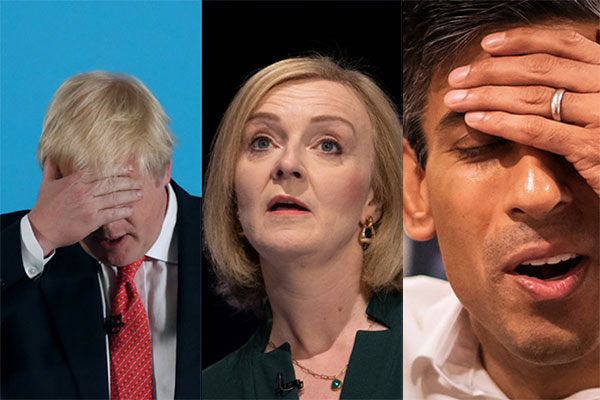The big personal financial events of 2022 and how they will affect your finances
7th December 2022 14:00
by Alice Guy from interactive investor
We review the big financial events of 2022 and the impact they will have on the money in your pocket.

With the Christmas turkey on order and 2022 nearly at an end, it’s time to look back on a chaotic, confusing and increasingly expensive year.
We started the year with Boris Johnson in Number 10 and a much-loved queen on the throne but ended it with Rishi Sunak at the helm and King Charles wearing the crown.
- Read about: Free regular investing | Opening a Stocks & Shares ISA | Cashback Offers
Here, we examine the big personal finance and political events of 2022, what they mean for you and your money, and whether they will bring any long-term financial consequences.
Cost-of-living crisis and inflation
We opened 2022 with inflation beginning to rise, but what began as a trickle gradually became a torrent. Inflation steadily rose from 5.4% in January to 11.1% in October as businesses struggled with increasing wages, energy, transport and purchase costs.
Rising inflation has threatened the financial security of many families who have had to dip into savings, and even pension pots, to fund rising food and energy bills.
Wages have risen more slowly than inflation, averaging 6.6% between July 2022 and September 2022, and the state pension, with the triple lock abandoned, rose by only 3.1% in April 2022.
With pressure mounting, the government announced in the Autumn Statement that the state pension triple lock will be reinstated in April 2023, meaning the state pension will rise by 10.1% next year (based on September inflation figure).
Conflict in Ukraine
In February 2022, Russia invaded Ukraine, to widespread international condemnation. What Vladimir Putin hoped would be a quick land-grab, turned into a protracted and bloody war, with no current end in sight.
Political and financial sanctions against Russia and the continuing conflict, contributed to rising energy and food costs. Russia and Ukraine are one of the world's biggest producers of wheat, gas, oil and many commodities, and Russia accounted for more than 39% of gas imports into Europe during 2021.
The financial impact of the war has pushed UK inflation higher, even though Russian gas makes up only 4% of UK gas used during 2021. Energy prices are determined by international wholesale markets and so the UK gas prices are directly affected by reduced supplies across Europe.
Energy crisis
The ongoing Ukraine conflict stoked already rising energy costs and wholesale gas prices soared.
The UK energy price cap, introduced by Theresa May, delayed the impact of rising gas prices to consumers. The price cap, originally set by Ofgem every six months, was tweaked in the summer to a more frequent three months, so suppliers could pass on price rises more quickly.
With gas prices beginning to rocket, the government stepped in with a series of measures to reduce the cost to British households.
In the summer, Sunak, then chancellor, introduced an extra cost-of-living payment, giving all households an extra £400 to help with energy costs, with additional support for poorer households and pensioners.
- Listen to our latest podcast episode: how to get the most out of Jeremy Hunt’s tax raid on investors
- Do British prime ministers influence economic growth?
In October, Liz Truss, soon to become the shortest-serving prime minister in British history, announced an energy guarantee where energy would be capped at £2,500 for two years: the government paying energy companies the difference between the price cap and the energy guarantee.
In November, Jeremy Hunt, now the fourth chancellor this year, reversed Liz Truss’ pledge and announced a reduced energy package. The energy guarantee will stay at £2,500 until March 2023, but then increase to £3,000 until April 2024.
This means that the average household is currently paying £2,500 per year for their energy and £3,000 from April 2023, compared to £1,277 at the end of December 2021. The average household would be paying £4,279 from January 2023 without the government intervening.
Interest rates
The Bank of England (BoE) responded to rising inflation with a series of interest rate hikes. Between January and November 2022, the base rate gradually climbed from 0.25% to 3%, with more rises likely in December and early next year.
The bank is following its remit to bring inflation back within 2%, but interest rates are a blunt instrument and there’s often a long delay before rate rises are effective. There’s a real risk that interest rates overshoot and contribute to a long recession.
The BoE base rate is used to set the interest rate for many products including mortgages, savings and lending rates, so rates rises could have a direct impact on your finances. If your mortgage deal is ending soon, it’s a good idea to keep an eye on rates, as they may fall back slightly in the new year. Bank rates run ahead of base rate rises and they price in expected future rises or falls in the base rate.

Mini-budget
After much fanfare, and a long summer of Tory in-fighting, one of Liz Truss’ first moves as prime minister was to sanction a spendthrift mini-budget by her chancellor Kwasi Kwarteng.
Despite the gathering economic clouds, the September mini-budget was full of expensive tax cuts and spending promises. The stock market responded with a resounding thumbs down and the pound and government-backed gilt prices plummeted.
Experts worried that government plans were unaffordable and that the new team was not a safe pair of hands.
- Do British prime ministers influence economic growth?
- Five ways the gilts crisis could affect your pension
Liz Truss rolled the dice again, appointing yet another chancellor, Jeremy Hunt, who immediately reversed most of the tax rises of the mini-budget. But it was not enough to save Truss, who resigned from the top job only 45 days after taking it.
Gilts crisis
The mini-budget debacle not only sparked political crisis, but also a financial one as government-backed gilt prices plunged in late September. Defined benefit pensions were in trouble as falling prices could potentially cause liquidity problems for many pension schemes.
The Bank of England stepped in to buy back government bonds and prop up the falling prices, averting disaster and bringing relative calm back to the markets.
Autumn Statement
In November, yet another prime minister, Rishi Sunak, took the reins and was quick to announce a new “fiscally responsible” budget-in-all-but-name.
Instead of tax cuts, tax rises were the order of the day as Jeremy Hunt, still in position as chancellor, stood at the despatch box. Tax thresholds were to be frozen until 2028, bringing many more taxpayers into higher tax thresholds and causing their tax burden to rise.
- Fiscal drag shock: why it hits us harder than a 1% rise in income tax
- Autumn Statement 2022: who are the real winners and losers?
A reduced energy support package means that the energy price guarantee will now rise from its current level of £2,500 to £3,000 in April 2023.
Hunt also hinted at spending cuts, but details were surprisingly lacking. It seems we will have to wait to see the extent of a possible Austerity 2.0.
Tax changes
Most of the tax changes announced in the Autumn Statement will come in during 2023.
The capital gains tax annual allowance is due to be reduced to £6,000 in 2023 and then £3,000 in 2024, while the dividend tax threshold will fall to £1,000 in 2023 and only £500 in 2024. This means more of us will be paying these taxes in the future and using our ISA allowances and pensions will become even more important.
Other tax changes include a reduction of the addition income tax threshold from £150,000 to £125,000, bringing more workers into the top 45% tax band.
Stock market volatility
With so many economic challenges, political events and financial upheaval, it’s not surprising that stock market volatility was significant during 2022.
The S&P 500 dropped from 4,800 at the start of January to a low point of 3,639 in June, then climbed again before falling briefly below 3,500 in October. At the time of writing, the S&P 500 is down 17.8% since January, although it’s still 48.6% higher than five years ago.
For long-term investors, it’s a reminder that although stock market investing tends to beat cash over time, there are always bumps along the road.
Looking ahead to 2023, it looks like a recession could be on the cards in the UK, although the depth and possible length of a downturn is under debate.
In any case, it’s important to keep our eyes on the goal of building our long-term wealth and remember that downturns can often offer good buying opportunities.
Merry Christmas, and let’s hope for a calmer 2023!
These articles are provided for information purposes only. Occasionally, an opinion about whether to buy or sell a specific investment may be provided by third parties. The content is not intended to be a personal recommendation to buy or sell any financial instrument or product, or to adopt any investment strategy as it is not provided based on an assessment of your investing knowledge and experience, your financial situation or your investment objectives. The value of your investments, and the income derived from them, may go down as well as up. You may not get back all the money that you invest. The investments referred to in this article may not be suitable for all investors, and if in doubt, an investor should seek advice from a qualified investment adviser.
Full performance can be found on the company or index summary page on the interactive investor website. Simply click on the company's or index name highlighted in the article.